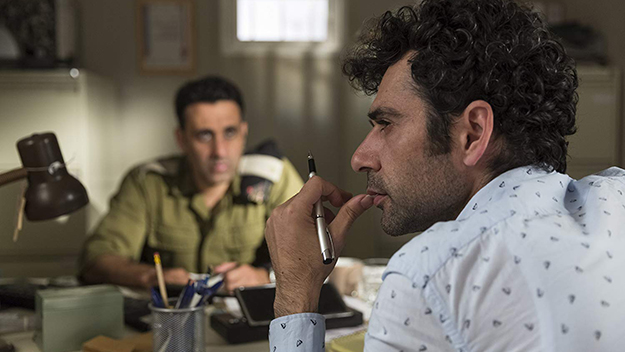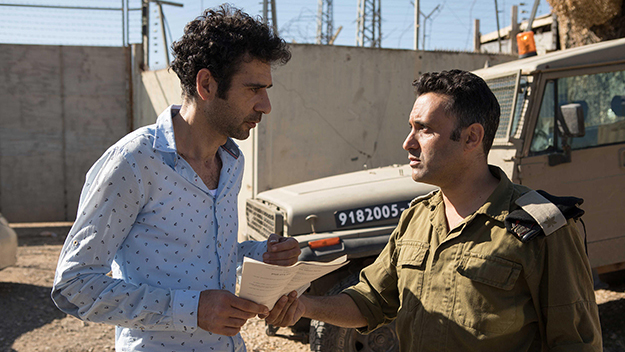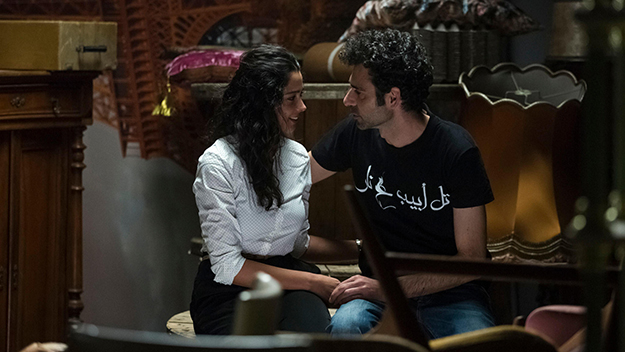Film of the Week: Tel Aviv on Fire

Tel Aviv on Fire (Sameh Zoabi, 2019)
The very term “soap opera” implies vapid frothiness. Originally a reference to radio serials being sponsored by soap companies, the term quickly came to signify a form of drama that is weightless, squeaky-clean, bubbly, and above all escapist, a reassuring distraction from the real problems of everyday life, public or private.
Filmmakers and other artists haven’t always seen it this way, however, and have often latched onto the TV soap opera as a format that can very directly be a reflection of real life or a refraction of it, an enlarging, distorting lens through which to view the world. Take The Wandering Soap Opera (La Telenovela Errante, 2017), a posthumously completed film in which the late Raúl Ruiz proposed that the only way to understand the paradoxes of modern Chilean history was through the hallucinatory, fragmented perspective of TV soap (although no actual series, except perhaps Twin Peaks: The Return, has ever approached the radical, irresolvable discontinuity of the programs imagined by Ruiz). Or take Prime Time Soap (La Novela de la 8), Odilon Rocha’s 2011 film, in which the horrors of Brazil’s 1970s dictatorship are played off against the glamorous fantasies—and, the film argues, the survival strategies—offered by Dancin’ Days, the massively popular disco-era series that consolidated Sonia Braga’s status as national icon.
The real-life situation satirically addressed in Sameh Zoabi’s comedy Tel Aviv on Fire is the Israeli-Palestinian tension, now and in the ’60s. Zoabi’s film shares its title with his film’s subject—an apocryphal TV serial made in Ramallah today, and watched avidly by viewers in both Palestine and Israel. The show is set in 1967, in the months before the Six-Day War. Its heroine Manal, played by French actress Tala—played in turn by Lubna Azabal, from Belgium—is a Palestinian militant working with her lover Marwan (Ashraf Farah) to seduce an Israeli general, Yehuda Edelman (Yousef “Joe” Sweid) and obtain secret military plans. To do this, Manal uses all her femme fatale wiles, posing as Jewish “Rachel Ashkenazi,” owner of “the best French restaurant in Tel Aviv.” The combination of glamour and cuisine prove a surefire way to the general’s heart, but the film is very funny about the idea that Arab and Jewish sensibilities alike might be susceptible to the same kinds of food: hummus, as a daily staple, a delicacy, and a bribe, features prominently.
Employed as a rather inept assistant on the show is the producer’s nephew Salam (Kais Nashif, who played a considerably darker role in Hany Abu-Assad’s 2005 suicide bomber drama Paradise Now). A gangling, moody figure who seems comically a little old for such an initially directionless, dorkish type, the nevertheless resourceful Salam is hired partly because he is able to offer advice on fine-tuning the show’s Hebrew dialogue for authenticity. One line he worries about is when “Rachel” is complimented on looking “explosive,” which he’s not sure is a compliment.

Driving home to Jerusalem, Salam asks the Israeli border guards for their opinion: the word “explosive” rings alarm bells, and he’s hauled up before checkpoint commander Assi (Yaniv Biton). Salam wriggles out of a tight situation by self-aggrandizingly presenting himself as the writer of the show; that fascinates Assi, whose family are addicted to it. Assi is aggrieved that Israel doesn’t emerge well from Tel Aviv. “It’s anti-Semitic,” he complains to his wife; she responds, “Not everything is political. It’s romantic,” then confesses she has a yen for Palestinian freedom fighter Marwan (“He’s a gentleman”).
Assi starts giving Salam advice on the storyline, but pressures him to make it more Israeli-friendly. In fact, to get the show that he wants, Assi confiscates Salam’s ID card; meanwhile, Salam starts plying him with Palestinian hummus in exchange for Hebrew dialogue. Salam, in fact, does get an official writing gig on the show, which also allows him to discreetly woo his skeptical ex, hospital doctor Mariam (Maïsa Abd Elhadi), who’s given him up as an irredeemable loser (what’s Arabic for “nebbish”?). Her put-downs are among the film’s choicest lines: “I heard you were in television. I thought you were fixing them.”
The show by now has heroine “Rachel” caught between two lovers, one Jewish, one Arab. Viewers are gripped, although not everyone’s happy: the Arabic press complain that the show has put “a kosher stamp” on Palestinian TV. But could the series actually end with a marriage between a Palestinian militant and an Israeli general? Salam’s boss, Uncle Bassam (a peppery Nadim Sawalha) is adamant that it can’t: “With our reality, there’s no Romeo and Juliet.” Such a marriage, says Bassam—who believes that Arab-Israeli entente is impossible—would be “another Oslo Peace Accord… the big illusion that changes nothing.” But just imagine if the marriage did happen, Salam says—it would be a way of ensuring a second season. That certainly appeals to Salam’s co-writer Nabil (Amer Hlehel): he wants the show to go on forever, “like American shows… like Palestine.” Bassam sees it differently, and won’t compromise with Israeli sympathies: angry about the failures of Oslo, he tells Salam, “I am making this show for your generation… to make up for everything we lost.” Salam replies, “Is there nothing between bombs and surrender?”—which is about as on-the-nose as the script, by Zoabi and Dan Kleinman, ever gets.

In fact, the romance between the spy and the general is not the only Jewish-Arab love story here. Another is the mutual fascination between Salam and Assi. “You know the sign that two people are in love?” says Assi, giving Salam script notes. “They listen to each other.” These guys certainly do, raptly, notwithstanding their very uneven power relations. But the film—made by a Palestinian-Israeli director with Israeli and European funding—is also a fond imagining of two cultures listening to each other. What Zoabi is evoking isn’t and can’t be a sentimental pipedream, given the intractable conflicts of which he is all too aware—no doubt one reason he has chosen to make a farce, rather than tell the sort of realist horror story one might expect the current situation to yield.
By and by, the film gets a little repetitive, with Salam in and out of Assi’s office for extended unofficial script conferences, or arguing with colleagues about the show’s direction. The film also settles in on a certain level of obviousness, having established the absurdity of the show’s Mata Hari seduction becoming an actual romance. But obviousness is part of the film’s appeal and its method for engaging with thorny questions of history, politics, and cultural difference—and, the implication is, unacknowledged similarity. The cast are a lot of fun—Azabal piling on the thespian vampiness in the evocatively overbaked show extracts, Nashif engagingly relaxed in his engagingly relaxed way. Some of the dialogue is relishably absurd, even in English subtitles (I love the idea of “Rachel” telling her lover, “I’m your pomegranate”).
There are some nice character touches, too, like the woman from the wardrobe department who is determined to parlay herself into the show as an actor. In fact, the backstage business somewhat reminded me of Grief (1993), by the late Richard Glatzer, another film in which the throwaway stuff of soap was one means of dealing with the pains of reality (one reason why it came to mind may be because the irascible woman director in Tel Aviv, Ula Tabari, looks a lot like Grief’s Ileana Douglas).
One of the film’s most appealing elements is the conceit of the series that simply muddles through from day to day. Now that the new age of long-form TV drama has got us used to the idea of story arcs rigorously mapped out seasons in advance, we’ve lost touch with an older idea of chaotic nowness, of a fiction that might improvise itself hectically as it goes along, evolving in response to chance and the unpredictable whims of the people involved—not just its makers, but all kinds of other people, viewers included, whose thoughts and actions have their own unpredictable effect. Lightweight though Zoabi’s film may feel, its valuable insight is that in many senses, political reality works in rather the same way.
Jonathan Romney is a contributing editor to Film Comment and writes its Film of the Week column. He is a member of the London Film Critics Circle.







